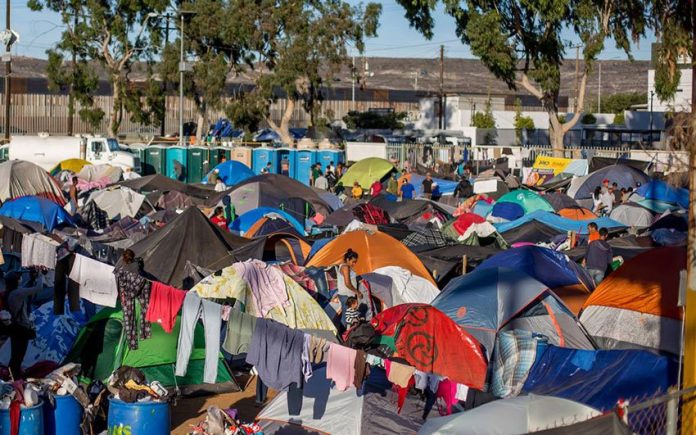The closure of the border between Tijuana and San Diego for almost six hours Sunday cost businesses in San Ysidro, California, an estimated US $5.3 million, according to a local business group.
Jason Wells, executive director of the San Ysidro Chamber of Commerce, said that more than 700 businesses located in the area immediately north of the port of entry suffered financial losses and that 75% of them closed for the entire day.
“The situation facing our border – mass migration of Central Americans from failed states – is complex and is felt nowhere as strongly as in San Ysidro,” Wells said, explaining that 93% of local businesses’ customers are from Mexico.
“Obviously businesses in Chula Vista, San Diego and further away were also affected,” he added.
The closure of the San Ysidro port of entry, the busiest binational crossing point in the world, followed a rush at the border by around 500 Central American migrants Sunday morning to which United States border agents responded with the use of tear gas.
Rahil Iqbal, who owns three discount clothing stores on San Ysidro Boulevard just north of the border, described the decision to shut the port of entry as a “disaster” for business and estimated his losses at between US $20,000 and $25,000.
“It was a very important day [of trading] lost,” he told NBC San Diego.
The migrant situation is also having an impact on the other side of the border.
Antonio Rico, president of the Tijuana Hotel Association, said the presence of thousands of Central American migrants in the border city and associated difficulties with crossing the border were also impacting negatively on the local tourism economy.
“We’ve had cancellations of more than 8,000 rooms. I’d say that there are about 80% fewer bookings from Mexicans and 20% fewer from international tourists who wanted to come here for the weekend. This all started with the arrival of the migrant caravan,” he said.
The day after the chaos at the border, United States President Trump warned that the border could be closed permanently “if need be.”
That threat, the president of the Los Angeles Customs Brokers and Freight Forwarders Association said, “must be taken seriously.”
Karen Quintana added that any future closure to the border between California and Mexico, especially one in the lead-up to Christmas, would cause complete chaos.
Mexico is California’s largest export market and millions of dollars’ worth of goods and produce cross the border in both directions every day.
Last year, Mexico spent at least US $26.7 billion on Californian exports, statistics show, and 12.1% of all Mexican exports to the United States cross the border in the San Diego area.
“Mexico is our biggest trade partner,” said Jock O’Connell, an analyst at Beacon Economics and one of California’s foremost authorities on world trade.
Closing the border, he added, would be akin to “cutting off your nose to spite your face.”
Source: Notimex (sp), NBC San Diego (en)
